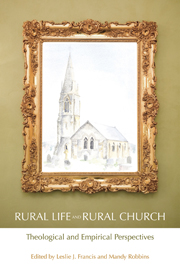Book contents
- Frontmatter
- Contents
- Preface
- Foreword by The Bishop of Shrewsbury, The Rt Revd Mark Rylands
- 1 Introduction: shaping rural theology
- PART 1 PERSPECTIVES FROM THE BIBLE
- PART 2 PERSPECTIVES FROM ORDINARY THEOLOGY
- PART 3 THEOLOGICAL AND SOCIOLOGICAL PERSPECTIVES
- PART 4 HISTORICAL PERSPECTIVES
- PART 5 LISTENING TO VISITORS
- PART 6 LISTENING TO THE COMMUNITY
- PART 7 LISTENING TO CHURCHGOERS
- PART 8 LISTENING TO CHURCH LEADERS
- PART 9 SATISFACTION AND STRESS IN MINISTRY
- Contributors
- Sources
- Subject Index
- Name Index
1 - Introduction: shaping rural theology
- Frontmatter
- Contents
- Preface
- Foreword by The Bishop of Shrewsbury, The Rt Revd Mark Rylands
- 1 Introduction: shaping rural theology
- PART 1 PERSPECTIVES FROM THE BIBLE
- PART 2 PERSPECTIVES FROM ORDINARY THEOLOGY
- PART 3 THEOLOGICAL AND SOCIOLOGICAL PERSPECTIVES
- PART 4 HISTORICAL PERSPECTIVES
- PART 5 LISTENING TO VISITORS
- PART 6 LISTENING TO THE COMMUNITY
- PART 7 LISTENING TO CHURCHGOERS
- PART 8 LISTENING TO CHURCH LEADERS
- PART 9 SATISFACTION AND STRESS IN MINISTRY
- Contributors
- Sources
- Subject Index
- Name Index
Summary
Abstract – This article situates the notion of rural theology within the broader framework of contemporary concern with contextual theologies. Then it identifies the contours of rural theology that give shape to the present volume: perspectives from the Bible, perspectives from ordinary theology, theological and sociological perspectives, historical perspectives, listening to visitors, listening to the community, listening to churchgoers, listening to church leaders, and satisfaction and stress in ministry.
Introduction
Theology is a discipline shaped more by its subject matter than by the methods with which the subject matter is approached. Theologians (ordinary theologians as much as professional theologians) are concerned with the study of discourse about God and with all that purports to reveal knowledge of God or to be concerned with the experience of God.
Throughout the twentieth century Christian theology became increasingly aware of the importance of perspective in informing and shaping the theological exercise. Contextual theology recognizes that the same subject matter may be viewed from different perspectives and that such perspectival viewing can generate authentic and legitimate insights into the subject matter that grasps the theologian's attention – the study of discourse about God. Liberation theology reflects on the insights of those who see God and hear God speak from the perspective of the oppressed. Feminist theology reflects on the insights of those who see God and hear God speak from the perspective of women. Black theology reflects on the insights of those who see God and hear God speak from the perspective of people of colour. Such perspectives are not in competition, but are complementary as the whole people of God talk about the things of God, as the whole people of God share their insights into the revelation of God.
- Type
- Chapter
- Information
- Rural Life and Rural ChurchTheological and Empirical Perspectives, pp. 1 - 6Publisher: Acumen PublishingPrint publication year: 2012

